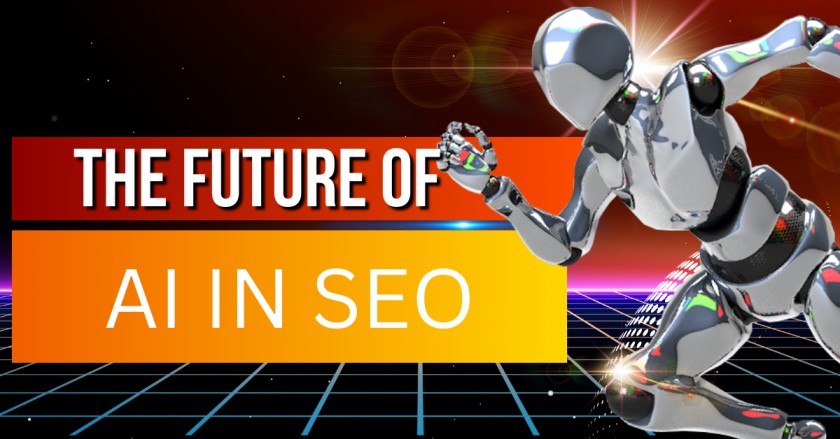The impact of artificial intelligence (AI) on search engine optimization (SEO) is no different from how it has transformed other businesses. As technology advances, AI-powered tools and algorithms reshape how businesses optimize their online presence and engage with their target audience.
AI is the simulation of human intelligence in machines that are programmed to think and learn like humans. Regarding SEO, AI is crucial to improving search engine rankings, enhancing the user experience, and optimizing website performance. Businesses may get valuable insights, automate procedures, and beat the competition using AI technologies.
This article examines artificial intelligence’s potential uses, advantages, and difficulties in SEO.
Understanding AI and SEO
AI has advanced significantly in recent years, making it possible for robots to carry out activities that previously required only human intelligence. On the other hand, SEO focuses on tailoring websites and content to improve visibility and natural search engine traffic. By combining the power of AI with SEO techniques, businesses can unlock new opportunities to improve their search rankings and enhance user experiences.
The Evolution of Machine Learning in SEO
Several industries, including SEO, have been transformed by machine learning, a branch of AI that has existed for years. Google’s RankBrain, for instance, has revolutionized how search results are determined. Machine learning technology adjusts and reacts in response to data, gradually improving its ability to respond to search queries. It provides better accuracy in search results at a speed beyond human capabilities.
AI-Powered Keyword Research
Since keywords are crucial to SEO, AI has changed how we find and use them. AI-powered systems may examine large amounts of data, including search trends, user behaviour, and competitor analysis, to locate relevant terms with high search volumes and low competition. This advanced keyword research helps businesses target the right audience and create content that aligns with user intent.
Content Generation, Natural Language Processing (NLP) and Content Optimization
Natural language processing (NLP) is one area of SEO where AI is significantly progressing. Search engines can deliver more accurate results because of NLP, which enables machines to comprehend and interpret human language. By integrating AI, search engines can better comprehend user intent and deliver highly relevant material.
By leveraging AI-powered tools, content creators can optimize their articles to match user intent effectively. AI algorithms can analyze search query language patterns and context, helping marketers create compelling, engaging content that aligns with user expectations. The probability of appearing higher on search engine results pages (SERPs) increases.
Enhanced User Experience with AI
The success of SEO depends heavily on the user experience (UX). Websites that offer seamless navigation, fast loading times, and relevant content tend to rank higher in search results. AI technology can help businesses improve their website’s UX by providing valuable insights and recommendations.
AI algorithms can analyze user behaviour data, such as bounce rates, time on page, and click-through rates, to identify areas for improvement. This information allows businesses to optimize their website structure, design, and content to enhance user satisfaction. Businesses can boost engagement and encourage conversions by giving users a smooth and customized experience.
The Changing Role of SEO Professionals
With the rise of machine learning, the role of SEO professionals is changing. They are now tasked with ensuring that their content is relevant, helpful, and provides a positive user experience across all devices, platforms, and formats. As machine learning continues to evolve, SEO professionals must adapt and learn new skills to stay competitive.
The Impact of Machine Learning on Technical SEO
Technical SEO will always be relevant, but the advent of machine learning can reduce the time and resources required for it. Machine learning can assist in keyword research, technical audits, content optimization, distribution, and internal linking. It allows SEO professionals to focus more on creating high-quality content based on user intent.
The Importance of Structured Data
Structured data is crucial as it helps search engines better understand content and return more informative results to end-users. Schema, for instance, can drive more organic traffic and increase visibility, indexation, and click-through rates.
Voice Search and Virtual Assistants
The rise of voice search and virtual assistants has transformed how people search for information online. Search engines can interpret and process voice instructions more accurately thanks to AI technologies like Natural Language Understanding (NLU) and Automatic Speech Recognition (ASR). Optimizing content for voice search queries is crucial for businesses to stay ahead in SEO.
Personalization and Predictive Analytics
AI-driven personalization is another area where SEO can significantly benefit. Businesses can deliver personalized content recommendations, product suggestions, and tailored search results by leveraging user data and machine learning algorithms. Predictive analytics can anticipate user behaviour, enabling businesses to optimize their SEO strategies and deliver targeted experiences that resonate with their audience.
AI for Link Building and Backlink Analysis
The process of finding high-quality backlinks, which is a crucial step in link building for SEO, can be sped up by AI. AI algorithms can examine enormous volumes of data to evaluate the authority and relevance of websites, assisting businesses in creating a solid backlink profile. Additionally, AI-powered tools can monitor backlinks, identify spammy links, and proactively address potential negative impacts on search rankings.
Ethical Considerations and Challenges
While the future of AI in SEO looks promising, some ethical considerations and challenges need to be addressed. Data privacy, transparency, and accountability are crucial when utilizing AI-powered tools. It is essential to balance automation and human oversight to maintain the integrity of SEO practices and avoid potential biases in algorithmic decision-making.
Conclusion
Businesses seeking to enhance their online presence and more successfully connect with their target audience will have many opportunities to do so by leveraging AI in SEO in the future. AI-powered tools and algorithms streamline keyword research, content generation, and personalization, enhancing user experiences and driving higher search rankings. However, ethical considerations and human oversight remain essential to ensuring AI’s responsible and effective use in SEO strategies.
FAQs
1. Will AI replace human SEO professionals?
While AI can automate certain aspects of SEO, human expertise is still essential for strategic decision-making, content creation, and ethical considerations.
2. Can AI guarantee top search rankings?
AI can certainly optimize your SEO efforts, but search engine rankings depend on various factors, including competition, content quality, and user relevance.
3. Is AI biased in search results?
AI algorithms can be biased if not adequately trained and monitored. Regular audits and human oversight are necessary to mitigate biases and ensure fair search rankings.
4. How can AI improve mobile SEO?
AI can analyze user behaviour, location data, and device preferences to deliver personalized and optimized mobile experiences, improving SEO performance.
5. Are there any risks associated with AI in SEO?
Risks include data privacy concerns, potential algorithm biases, and overreliance on automation. Businesses must tread carefully and maintain a balance between AI and human involvement.
In conclusion, AI is transforming SEO by allowing businesses to improve their online exposure, interact with their audience, and provide individualized experiences. As technology advances, leveraging AI in SEO strategies will become increasingly crucial for staying competitive in the digital landscape. However, it is essential to approach AI implementation responsibly, considering ethical considerations and maintaining a balance between automation and human expertise.





